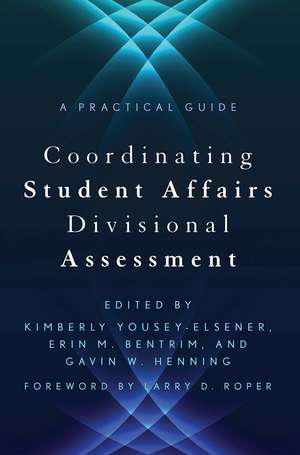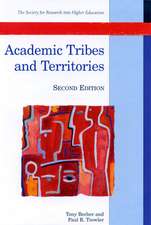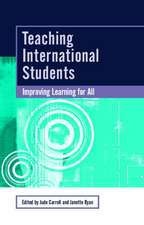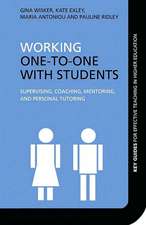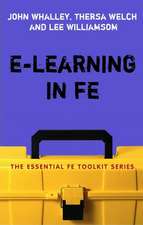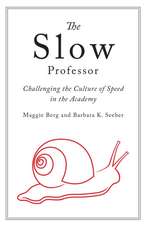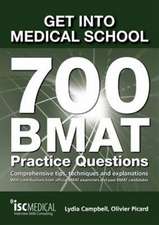Coordinating Student Affairs Divisional Assessment: A Practical Guide
Cuvânt înainte de Larry D. Roper Editat de Erin Bentrim, Gavin W. Henning, Kimberly Yousey-Elseneren Limba Engleză Paperback – 4 dec 2015
| Toate formatele și edițiile | Preț | Express |
|---|---|---|
| Paperback (1) | 270.29 lei 6-8 săpt. | |
| Taylor & Francis – 4 dec 2015 | 270.29 lei 6-8 săpt. | |
| Hardback (1) | 1094.10 lei 6-8 săpt. | |
| Taylor & Francis – 8 dec 2015 | 1094.10 lei 6-8 săpt. |
Preț: 270.29 lei
Preț vechi: 284.52 lei
-5% Nou
Puncte Express: 405
Preț estimativ în valută:
51.72€ • 55.31$ • 43.12£
51.72€ • 55.31$ • 43.12£
Carte tipărită la comandă
Livrare economică 17 aprilie-01 mai
Preluare comenzi: 021 569.72.76
Specificații
ISBN-13: 9781620363287
ISBN-10: 1620363283
Pagini: 176
Dimensiuni: 152 x 229 x 8 mm
Greutate: 0.45 kg
Ediția:1
Editura: Taylor & Francis
Colecția Routledge
Locul publicării:Oxford, United Kingdom
ISBN-10: 1620363283
Pagini: 176
Dimensiuni: 152 x 229 x 8 mm
Greutate: 0.45 kg
Ediția:1
Editura: Taylor & Francis
Colecția Routledge
Locul publicării:Oxford, United Kingdom
Public țintă
Postgraduate and Professional Practice & DevelopmentCuprins
Figures Foreword. Larry D. Roper Preface. Erin M. Bentrim, Gavin W. Henning, and Kimberly Yousey-Elsener 1. Tenet One. Building Capacity in Student Affairs Assessment. Roles of Student Affairs Assessment Coordinators. Erin M. Bentrim and Gavin W. Henning 2. Tenet Two. Cultivating A Culture of Assessment. Gavin W. Henning 3. Tenet Three. Developing Infrastructure for Student Affairs Assessment Practices. Michael Christakis and Dan Bureau 4. Tenet Four. Leading Logistical and Administrative Assessment Tasks in Student Affairs. Justin Keen 5. Tenet Five. Using Technology to Advance Assessment. Erin Bentrim and Ted Elling 6. Tenet Six. Building Talent and Increasing Assessment Knowledge. Vicki L. Wise and Robert W. Aaron 7. Tenet Seven. Connecting Assessment to Planning, Decision Making, and Resource Allocation. James R. Doyle and Ellen S. Meents-DeCaigny 8. Tenet Eight. Cultivating Ethical Assessment Practice. Kimberly Yousey-Elsener and Becki Elkins 9. Tenet Nine. Navigating Politics. Darby Roberts 10. Tenet Ten. “Other Duties As Assigned”. Kimberly Yousey-Elsener and M. Erin Bentrim Editors and Contributors Index
Notă biografică
Erin M. Bentrim is a Senior Education & Training Specialist for Assessment at Anthology, Inc. Her higher education portfolio includes management level positions in Institutional Research and Effectiveness, Academic Assessment, Student Affairs Assessment, and Strategic Planning. In addition to her administrative roles, Dr. Bentrim has experience teaching graduate and undergraduate level courses in diverse subject matters including psychology, higher education administration, and educational statistics. Dr. Bentrim is a founding member of the Student Affairs Assessment Leaders (SAAL) organization which serves individuals responsible for implementing assessment on their respective campuses. Dr. Bentrim holds a PhD in Educational Psychology & Research, an MEd in Student Personnel Services, both from the University of South Carolina, and is a Phi Beta Kappa graduate of Wofford College where she earned a BA in English. Gavin W. Henning is Professor of Higher Education at New England College in New Hampshire where he directs the Master of Science in Higher Education Administration and Doctorate of Education programs. Gavin is a past president of ACPA – College Student Educators International as well as a past president of the Council for the Advancement of Standards in Higher Education (CAS). He has over 20 years’ experience in higher education assessment and institutional research and frequently consults and presents regionally, nationally, and internationally on the topic. His scholarship includes over 90 peer-reviewed presentations and over 90 invited presentations and keynotes regarding assessment. In addition, he has published articles and books on assessment including Student Affairs Assessment: Theory and Practice with Darby Roberts that serves as the foundational text for assessment courses in many higher education graduate programs. Gavin earned his Ph.D. in Leadership and Policy Studies from the University of New Hampshire. Kimberly Yousey-Elsener
Recenzii
"[The] editors have provided a comprehensive guide for coordinating assessment within the complex organizational environments of student affairs divisions. Ostensibly written for newly hired assessment coordinators, the discussions of coordinators’ responsibilities presented in this book will also be of interest to experienced incumbents as well as individuals aspiring to these unique roles.
Among the book’s many notable strengths is the extensive professional assessment experience of chapter authors and editors. Readers will also find a number of useful tools for organizing and coordinating divisional assessment in almost every chapter, including lists of resources for teaching assessment skills to colleagues, frameworks for strategic planning, and a trove of online resources for developing divisional assessment materials.
While intended for assessment coordinators, this volume is also essential reading for vice presidents and other senior student affairs leaders considering creating an assessment coordinator position or wishing to better understand the role. Faculty members teaching assessment courses may find that the applied nature of the book helps students connect key concepts to professional practice."
Teachers College Record
“Coordinating Student Affairs Divisional Assessment is a comprehensive A-Z guide to establishing, evolving and sustaining a student affairs division assessment program. The authors offer a practical and professionally grounded model to inform and support successful leadership of student affairs assessment.
The beauty and brilliance of Coordinating Student Affairs Divisional Assessment is in the aggregate design it offers to demystify student affairs assessment and make successful leadership accessible.
This book should be on the reading list of every senior student affairs officer, regardless of where his or her division is in implementation of its assessment program, as [it] not only offers a process for initiating assessment program, but also provides a guide for evaluating the successful functioning of programs. Data will continue to be crucial to the success and survival of student affairs, as well as the successful stewardship of student affairs organizations and institutional resources. This book contributes greatly to our ability to have a positive and productive future.”
Larry D. Roper
Oregon State University
Among the book’s many notable strengths is the extensive professional assessment experience of chapter authors and editors. Readers will also find a number of useful tools for organizing and coordinating divisional assessment in almost every chapter, including lists of resources for teaching assessment skills to colleagues, frameworks for strategic planning, and a trove of online resources for developing divisional assessment materials.
While intended for assessment coordinators, this volume is also essential reading for vice presidents and other senior student affairs leaders considering creating an assessment coordinator position or wishing to better understand the role. Faculty members teaching assessment courses may find that the applied nature of the book helps students connect key concepts to professional practice."
Teachers College Record
“Coordinating Student Affairs Divisional Assessment is a comprehensive A-Z guide to establishing, evolving and sustaining a student affairs division assessment program. The authors offer a practical and professionally grounded model to inform and support successful leadership of student affairs assessment.
The beauty and brilliance of Coordinating Student Affairs Divisional Assessment is in the aggregate design it offers to demystify student affairs assessment and make successful leadership accessible.
This book should be on the reading list of every senior student affairs officer, regardless of where his or her division is in implementation of its assessment program, as [it] not only offers a process for initiating assessment program, but also provides a guide for evaluating the successful functioning of programs. Data will continue to be crucial to the success and survival of student affairs, as well as the successful stewardship of student affairs organizations and institutional resources. This book contributes greatly to our ability to have a positive and productive future.”
Larry D. Roper
Oregon State University
Descriere
An ACPA/NASPA Joint Publication The need for the new role of student affairs assessment coordinator has emerged in response to the increasing demand for outcomes information, the proliferation of data, and the recognition that coordinating this work within divisions is of paramount importance.
